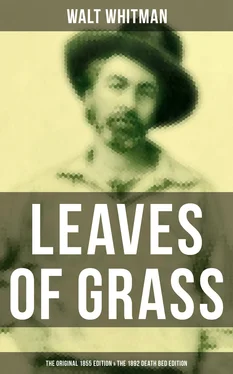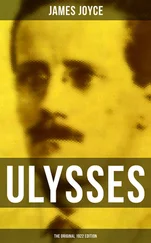What do you think has become of the young and old men?
And what do you think has become of the women and children?
They are alive and well somewhere;
The smallest sprout shows there is really no death,
And if ever there was it led forward life, and does not wait at the end to arrest it,
And ceased the moment life appeared.
All goes onward and outward . . . . and nothing collapses,
And to die is different from what any one supposed, and luckier.
Has any one supposed it lucky to be born?
I hasten to inform him or her it is just as lucky to die, and I know it.
I pass death with the dying, and birth with the new-washed babe . . . . and am not contained between my hat and boots,
And peruse manifold objects, no two alike, and every one good,
The earth good, and the stars good, and their adjuncts all good.
I am not an earth nor an adjunct of an earth,
I am the mate and companion of people, all just as immortal and fathomless as myself;
They do not know how immortal, but I know.
Every kind for itself and its own . . . . for me mine male and female,
For me all that have been boys and that love women,
For me the man that is proud and feels how it stings to be slighted,
For me the sweetheart and the old maid . . . . for me mothers and the mothers of mothers,
For me lips that have smiled, eyes that have shed tears,
For me children and the begetters of children.
Who need be afraid of the merge?
Undrape . . . . you are not guilty to me, nor stale nor discarded,
I see through the broadcloth and gingham whether or no,
And am around, tenacious, acquisitive, tireless . . . . and can never be shaken away.
The little one sleeps in its cradle,
I lift the gauze and look a long time, and silently brush away flies with my hand.
The youngster and the redfaced girl turn aside up the bushy hill,
I peeringly view them from the top.
The suicide sprawls on the bloody floor of the bedroom.
It is so . . . . I witnessed the corpse . . . . there the pistol had fallen.
The blab of the pave . . . . the tires of carts and sluff of bootsoles and talk of the promenaders,
The heavy omnibus, the driver with his interrogating thumb, the clank of the shod horses on the granite floor,
The carnival of sleighs, the clinking and shouted jokes and pelts of snowballs;
The hurrahs for popular favorites . . . . the fury of roused mobs,
The flap of the curtained litter -- the sick man inside, borne to the hospital,
The meeting of enemies, the sudden oath, the blows and fall,
The excited crowd -- the policeman with his star quickly working his passage to the centre of the crowd;
The impassive stones that receive and return so many echoes,
The souls moving along . . . . are they invisible while the least atom of the stones is visible?
What groans of overfed or half-starved who fall on the flags sunstruck or in fits,
What exclamations of women taken suddenly, who hurry home and give birth to babes,
What living and buried speech is always vibrating here . . . . what howls restrained by decorum,
Arrests of criminals, slights, adulterous offers made, acceptances, rejections with convex lips,
I mind them or the resonance of them . . . . I come again and again.
The big doors of the country-barn stand open and ready
The dried grass of the harvest-time loads the slow-drawn wagon,
The clear light plays on the brown gray and green intertinged,
The armfuls are packed to the sagging mow:
I am there . . . . I help . . . . I came stretched atop of the load,
I felt its soft jolts . . . . one leg reclined on the other,
I jump from the crossbeams, and seize the clover and timothy,
And roll head over heels, and tangle my hair full of wisps.
Alone far in the wilds and mountains I hunt,
Wandering amazed at my own lightness and glee,
In the late afternoon choosing a safe spot to pass the night,
Kindling a fire and broiling the freshkilled game,
Soundly falling asleep on the gathered leaves, my dog and gun by my side.
The Yankee clipper is under her three skysails . . . . she cuts the sparkle and scud,
My eyes settle the land . . . . I bend at her prow or shout joyously from the deck.
The boatmen and clamdiggers arose early and stopped for me,
I tucked my trowser-ends in my boots and went and had a good time,
You should have been with us that day round the chowder-kettle.
I saw the marriage of the trapper in the open air in the far-west . . . . the bride was a red girl,
Her father and his friends sat near by crosslegged and dumbly smoking . . . . they had moccasins to their feet and large thick blankets hanging from their shoulders;
On a bank lounged the trapper . . . . he was dressed mostly in skins . . . . his luxuriant beard and curls protected his neck,
One hand rested on his rifle . . . . the other hand held firmly the wrist of the red girl,
She had long eyelashes . . . . her head was bare . . . . her coarse straight locks descended upon her voluptuous limbs and reached to her feet.
The runaway slave came to my house and stopped outside,
I heard his motions crackling the twigs of the woodpile,
Through the swung half-door of the kitchen I saw him limpsey and weak,
And went where he sat on a log, and led him in and assured him,
And brought water and filled a tub for his sweated body and bruised feet,
And gave him a room that entered from my own, and gave him some coarse clean clothes,
And remember perfectly well his revolving eyes and his awkwardness,
And remember putting plasters on the galls of his neck and ankles;
He staid with me a week before he was recuperated and passed north,
I had him sit next me at table . . . . my firelock leaned in the corner.
Twenty-eight young men bathe by the shore,
Twenty-eight young men, and all so friendly,
Twenty-eight years of womanly life, and all so lonesome.
She owns the fine house by the rise of the bank,
She hides handsome and richly drest aft the blinds of the window.
Which of the young men does she like the best?
Ah the homeliest of them is beautiful to her.
Where are you off to, lady? for I see you,
You splash in the water there, yet stay stock still in your room.
Dancing and laughing along the beach came the twenty-ninth bather,
The rest did not see her, but she saw them and loved them.
The beards of the young men glistened with wet, it ran from their long hair,
Little streams passed all over their bodies.
An unseen hand also passed over their bodies,
It descended tremblingly from their temples and ribs.
The young men float on their backs, their white bellies swell to the sun . . . . they do not ask who seizes fast to them,
They do not know who puffs and declines with pendant and bending arch,
They do not think whom they souse with spray.
The butcher-boy puts off his killing-clothes, or sharpens his knife at the stall in the market,
I loiter enjoying his repartee and his shuffle and breakdown.
Blacksmiths with grimed and hairy chests environ the anvil,
Each has his main-sledge . . . . they are all out . . . . there is a great heat in the fire.
From the cinder-strewed threshold I follow their movements,
The lithe sheer of their waists plays even with their massive arms,
Overhand the hammers roll -- overhand so slow -- overhand so sure,
They do not hasten, each man hits in his place.
The negro holds firmly the reins of his four horses . . . . the block swags underneath on its tied-over chain,
The negro that drives the huge dray of the stoneyard . . . . steady and tall he stands poised on one leg on the stringpiece,
Читать дальше












